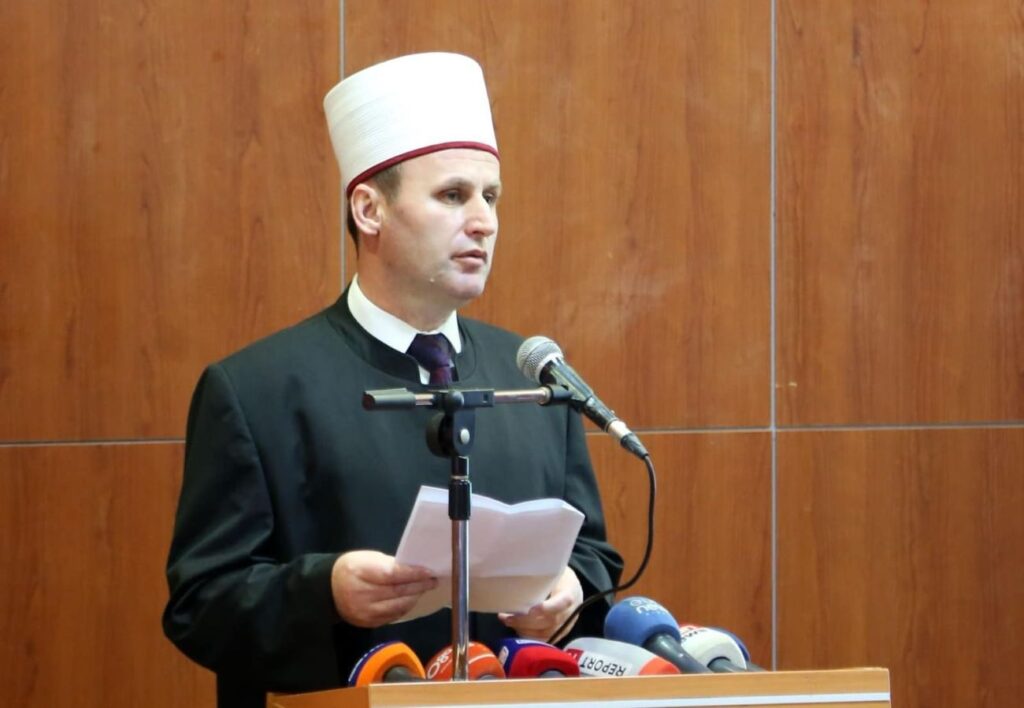
The election of Bujar Spahiu as the new head of the Albanias an Muslim Community was marred by opponents’ allegations that he supports Turkish cleric Fetullah Gulen, who is wanted for arrest by the Ankara government.
Controversy has continued to surround the election at the weekend of Bujar Spahiu as the new head of the Albanian Muslim Community, after a group of believers protested outside the Tirana Medrese building where the vote was being held.
Spahiu won a second term as the leader of the Albanian Muslim Community – the official, state-funded national organisation representing the country’s Muslims – with 84 votes out of 92 members participating in the election on Saturday, despite opponents’ claims that he supports exiled Turkish cleric Fetullah Gulen.
Gulen is wanted by the Ankara authorities for allegedly leading a terrorist organisation responsible for a failed coup attempt in 2016. Turkey describes Gulen’s network as the Fethullahist Terrorist Organisation, or FETO.
The protesters in Tirana carried banners with slogans like “Gulenists should stop occupying the Muslim Community of Albania” and “Save the Muslim Community of Albania from the tentacles of FETO”.
Spahiu has not commented on the allegations directly, but has said that the Muslim Community is a “stability factor”.
Romario Shehu, a researcher of security issues at the Institute for Democracy and Mediation in Tirana, told BIRN that disputes within Islamic groups in Albania have increased since 2016 “due to the Turkish government’s clashes with the so-called ‘Gulen Movement’”.
“In recent years, the Turkish government has increased pressure on the Albanian Muslim Community to replace its current leaders, who are seen by Ankara as Gulenists, with other figures with whom Turkey can cooperate more closely,” Shehu said.
He argued that foreign influence on religious communities must be constantly monitored because of the challenges it presents to Albania.
He said that a 2021 study by the Institute for Democracy and Mediation showed that while tensions between different groups of Albanian Muslims are not widespread, they do have the potential to cause damage in the future.
“Although the study data up to 2021 shows that these tensions between different Islamic groups have not penetrated widely among the Albanian faithful, the escalation of non-constructive debates has the potential to create factions between clerics and Muslim practitioners in the country, to damage internal unity, damage the image of Islam and prevent the creation of a common ‘front’ against the challenges that Islam faces,” he explained.
Since the failed coup attempt in 2016, Turkish President Recep Tayyip Erdogan has called on Albania several times to extradite so-called ‘Gulenists’ for prosecution.
In November, at a joint press conference in Ankara, Turkish Foreign Minister Mevlut Cavusoglu increased the pressure on his Albanian counterpart to hand over wanted fugitives, handing him a new list of suspected Gulenists.
“Today, we shared the necessary information about the extradition of some people to Turkey,” Cavusoglu said. He also praised the closure of a Gulen-run school in Albania. The Mehmet Akif Ersoy College was closed in September 2023.
Albanian Prime Minister Edi Rama has said schools affiliated with Gulen were being closed because they do not meet legal standards, but many suspect the decision was made to please Turkey’s president.
Albania controversially deported a Gulenist to Turkey in 2020 who was attempting to flee to Canada. Kosovo and Moldova have also returned suspected Gulenists to Turkey despite sharp criticism from rights organisations, the EU and their own opposition parties.
In 2015, Albania started to construct one of the biggest mosques in Tirana, the Mosque of Namazgah, as a gift from Turkey. The mosque was supposed to be inaugurated in 2019 but the official opening has been delayed. Many suspect this is because Albania has not yet fulfilled all Turkey’s requests for the extradition of alleged Gulenists.
